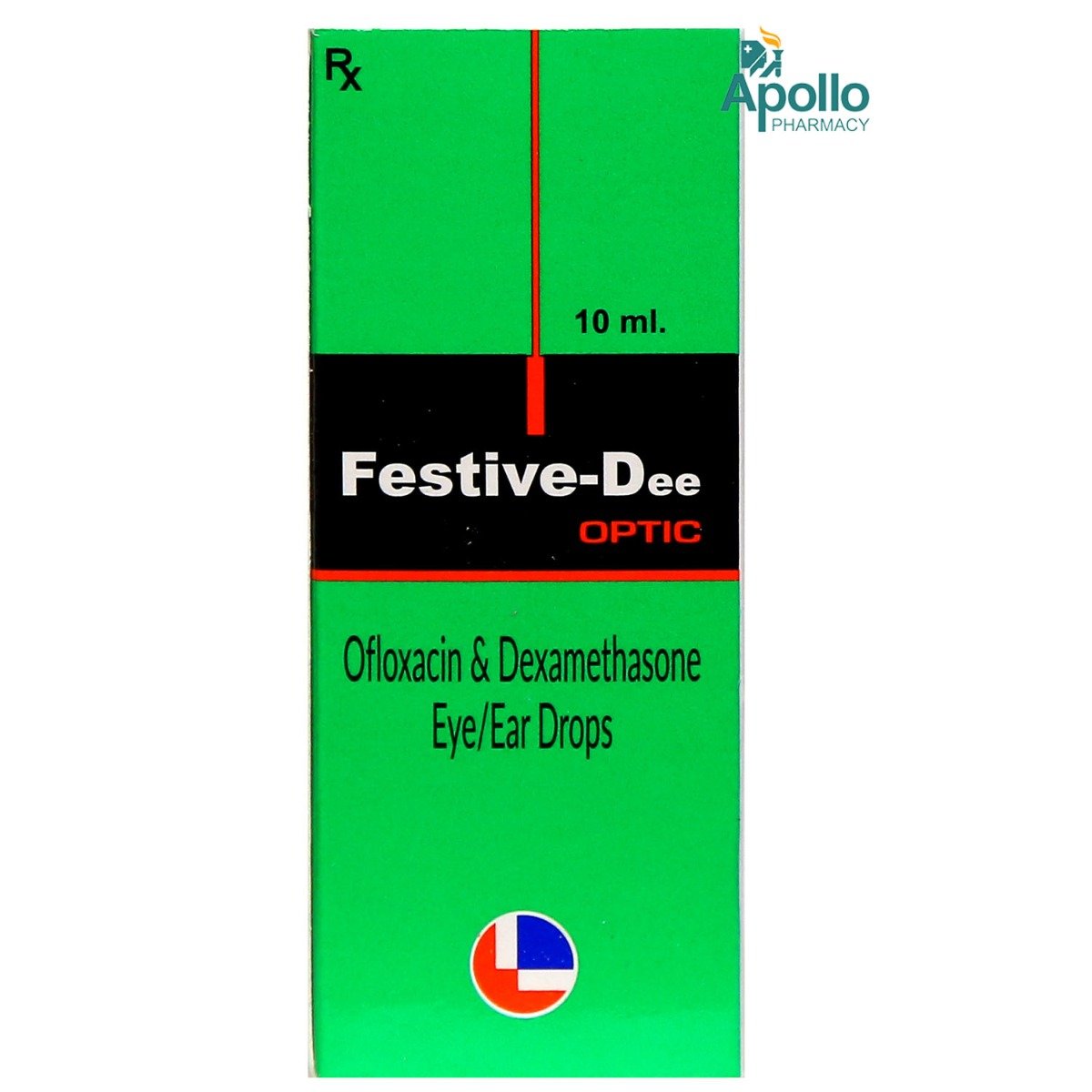Ofloxacin+dexamethasone Phosphate+hydroxy Propyl Methyl Cellulose
About Ofloxacin+dexamethasone Phosphate+hydroxy Propyl Methyl Cellulose
Dexamethasone Phosphate+hydroxy Propyl Methyl Cellulose+ofloxacin is primarily used to treat bacterial infections of the ear and eye. Bacterial eye infection is associated with the inflammation or infection of the conjunctiva (white part of the eye) and the inner eyelid. An ear infection occurs when the bacteria affect the middle or outer ear, leading to pain and inflammation.
Dexamethasone Phosphate+hydroxy Propyl Methyl Cellulose+ofloxacin contains Ofloxacin, Dexamethasone phosphate, and Hydroxypropyl methylcellulose. Ofloxacin works by inhibiting bacterial DNA gyrase, an enzyme required for the replication, transcription, and repair of the DNA. Dexamethasone phosphate blocks the production of prostaglandins that make the affected area red, swollen, and itchy. Hydroxypropyl methylcellulose relieves the dryness and irritation of the eyes caused due to reduced tear flow. It acts as a lubricant and moistens the ear.
Use Dexamethasone Phosphate+hydroxy Propyl Methyl Cellulose+ofloxacin in the dose and duration prescribed by your doctor based on your medical condition. Dexamethasone Phosphate+hydroxy Propyl Methyl Cellulose+ofloxacin is generally safe to use. However, some may experience side effects like temporary stinging, burning, redness or watering of the eyes, eye/ear discomfort and irritation. Most of these side effects of Dexamethasone Phosphate+hydroxy Propyl Methyl Cellulose+ofloxacin do not require medical attention and gradually resolve over time. If these side effects persist longer, please consult your doctor.
If you are allergic to Dexamethasone Phosphate+hydroxy Propyl Methyl Cellulose+ofloxacin or any other medicines, please tell your doctor. Inform your doctor if you have liver or kidney diseases, fungal infections, and heart problems before using Dexamethasone Phosphate+hydroxy Propyl Methyl Cellulose+ofloxacin. Pregnant and breastfeeding women should use Dexamethasone Phosphate+hydroxy Propyl Methyl Cellulose+ofloxacin with proper consultation and caution. Drive or operate machinery only when you do not experience any discomfort in the eyes while using eye drops.
Uses of Ofloxacin+dexamethasone Phosphate+hydroxy Propyl Methyl Cellulose
Medicinal Benefits
Dexamethasone Phosphate+hydroxy Propyl Methyl Cellulose+ofloxacin treats various bacterial infections of the eye and ear. It contains Ofloxacin, Dexamethasone phosphate, and Hydroxypropyl methylcellulose. Ofloxacin is a quinolone antibiotic that inhibits bacterial DNA gyrase, an enzyme required for the replication, transcription, and repair of the DNA. Dexamethasone phosphate is a corticosteroid and blocks prostaglandins' production (chemical messengers) that make the affected area red, swollen and itchy. Hydroxypropyl methylcellulose relieves the dryness and irritation of the eyes caused due to reduced tear flow. It acts as a lubricant and moistens the ear.
Directions for Use
Storage
Side Effects of Ofloxacin+dexamethasone Phosphate+hydroxy Propyl Methyl Cellulose
- Eye/ear discomfort
- Eye irritation
- Temporary stinging
- Burning sensation
- Redness
- Watering of the eyes.
Drug Warnings
Do not use Dexamethasone Phosphate+hydroxy Propyl Methyl Cellulose+ofloxacin if you are allergic to any of its components. Please let your doctor know if you have a history of liver or kidney diseases, heart problems, fungal infections, and ulceration of the eye. Please consult your doctor if you plan to conceive, are pregnant, or breastfeeding before starting Dexamethasone Phosphate+hydroxy Propyl Methyl Cellulose+ofloxacin. Do not drive or operate machinery if you experience blurred vision. Dexamethasone Phosphate+hydroxy Propyl Methyl Cellulose+ofloxacin is not recommended for use in infants younger than one year of age.
Drug Interactions
Drug-Drug Interaction: Dexamethasone Phosphate+hydroxy Propyl Methyl Cellulose+ofloxacin may interact with fits medicines (phenytoin, phenobarbitone), respiratory drugs (ephedrine), antibiotics (rifampicin), and HIV/AIDS medicines (ritonavir, cobicistat).
Drug-Food Interaction: No interactions found
Drug-Disease Interaction: Inform your doctor if you have ulceration of the eye or heart problems such as prolonged QT interval.
Drug-Drug Interactions Checker List:
Safety Advice

Alcohol
cautionIt is not known if alcohol interacts with Dexamethasone Phosphate+hydroxy Propyl Methyl Cellulose+ofloxacin. Please consult a doctor.

Pregnancy
cautionThere is limited data on how the Dexamethasone Phosphate+hydroxy Propyl Methyl Cellulose+ofloxacin affects pregnancy. Please consult your doctor if you plan to become pregnant or are already pregnant before starting Dexamethasone Phosphate+hydroxy Propyl Methyl Cellulose+ofloxacin.

Breast Feeding
cautionIt is not known if Dexamethasone Phosphate+hydroxy Propyl Methyl Cellulose+ofloxacin affects breastfeeding. Please consult your doctor before starting Dexamethasone Phosphate+hydroxy Propyl Methyl Cellulose+ofloxacin if you are a breastfeeding mother.

Driving
cautionDo not drive or operate machinery if you experience any burning sensation in the eyes, blurred vision and other visual disturbances while using Dexamethasone Phosphate+hydroxy Propyl Methyl Cellulose+ofloxacin.

Liver
cautionPlease use Dexamethasone Phosphate+hydroxy Propyl Methyl Cellulose+ofloxacin with caution and doctor's advice if you have a history of liver diseases/conditions.

Kidney
cautionPlease use Dexamethasone Phosphate+hydroxy Propyl Methyl Cellulose+ofloxacin with caution and doctor's advice if you have a history of kidney diseases/conditions.

Children
cautionSafety and effectiveness of Dexamethasone Phosphate+hydroxy Propyl Methyl Cellulose+ofloxacin in infants below the age of one year have not been established. Please consult your doctor for more information.
Habit Forming
Diet & Lifestyle Advise
Eye infections:
- Wash your hands regularly. Avoid touching the eyes with dirty hands.
- Avoid rubbing the eyes.
- Avoid sharing eye makeup such as eyeliner, mascara or kohl.
- Always use clean towels or tissues to wipe your eyes and face.
- Regularly wash and change the pillowcases.
- If you wear contact lens: Clean and replace contact lens more often. Never share contact lens. Always remember to wash your hands before inserting and after removing the contact lens.
- Avoid staring at the digital screens for longer durations. Rest your eyes for every 20minutes.
- Blink regularly as it helps in the spread of hydrating substances such as mucus and tears across the eyes.
Ear infections:
- Include fruits, vegetables, high-quality proteins and whole wheat grains in your diet to strengthen the immune system.
- Avoid consuming foods that you are allergic to as it can cause the body to produce excess mucus leading to inflammation.
- Avoid getting things like shampoo, soap, and water into the ear as it can cause itching.
- Do not poke or scratch the ear as it can cause damage to the ear canal, leading to inflammation. The inflamed skin can be infected by bacteria or fungi, which can cause infections in the ear.
- Stay healthy as immunity prevents infections.
Patients Concern
Disease/Condition Glossary
Bacterial eye infections: The common bacterial eye infections are conjunctivitis, stye, and keratitis. Conjunctivitis (pink eye) is the infection or inflammation of the conjunctiva (white part of the eye) and the inner eyelid. A stye is a bump on the eyelid or base of eyelashes. Keratitis is the inflammation of the cornea. It is a common problem in people who wear contact lenses. Symptoms include redness, pain, discomfort, itchiness, burning sensation, and watery discharge from the eye.
Bacterial ear infections: An ear infection occurs when the bacteria affect the middle or outer ear, leading to pain and inflammation. An ear infection occurs when the Eustachian tubes (small tunes that run from each ear to the back of the throat) become blocked or swollen. Ear infections can be painful due to inflammation and fluid build-up. Symptoms include pain or discomfort inside the ear, pus or fluid-like drainage from the ear, feeling of pressure inside the ear, and loss of hearing.
FAQs
Dexamethasone Phosphate+hydroxy Propyl Methyl Cellulose+ofloxacin contains Ofloxacin, Dexamethasone phosphate, and Hydroxypropyl methylcellulose. It helps treat bacterial infections by preventing bacterial growth and reduces the redness and itchiness in the infected areas.
Dexamethasone Phosphate+hydroxy Propyl Methyl Cellulose+ofloxacin consists of Ofloxacin, a quinolone antibiotic that may cause hypoglycaemia (low blood sugar levels). It is advised to consult your doctor before using Dexamethasone Phosphate+hydroxy Propyl Methyl Cellulose+ofloxacin and monitor your blood sugar levels regularly.
Do not stop using Dexamethasone Phosphate+hydroxy Propyl Methyl Cellulose+ofloxacin even if you feel better until the doctor's advised course is finished. Your symptoms may improve, but the infection may not be cured completely.
Avoid wearing contact lens while using Dexamethasone Phosphate+hydroxy Propyl Methyl Cellulose+ofloxacin in the eye. Remove contact lens before administering Dexamethasone Phosphate+hydroxy Propyl Methyl Cellulose+ofloxacin into the eyes and re-insert them 15minutes after using Dexamethasone Phosphate+hydroxy Propyl Methyl Cellulose+ofloxacin.
Avoid touching the tip of the container to ear/eye or its surrounding areas as it may contaminate the solution.
Available Medicines for
Ofloxacin+dexamethasone Phosphate+hydroxy Propyl Methyl Cellulose




